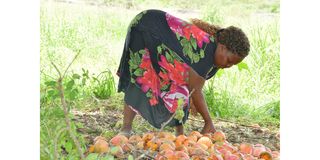How pulp factory left Tana mango farmers in poverty

A mango farmer counts her losses at her farm in Kibusu village, Tana Delta where farmers have lost more than 80 tonnes of mangoes for lack of a market.
When Tana River-based mango pulp processor Galole Fruit roared back to life in 2019, mango farmers were elated.
Finally, they had found a market for the thousands of tonnes of mangoes that were going bad on farms every season as they watched helplessly.
They knew this was the end of manipulation by middlemen who bought their fruit for a pittance and a new dawn that would usher in riches.
They must have counted their eggs way too early, as three years down the line, they are in the same spot they were.
"The plant was to save us from the loss of more than 20,000 tonnes of mangoes.
The Coast Development Authority even encouraged us to increase production, saying that what we produced was less than what the plant needed," said Jonathan Jilo.
The plant was to produce 40,000 metric tonnes of pulp per year as the machines that had been stalled since 2015 came back to life.
“We have leapt from the initial 2,880 tonnes, increasing our output to 40,000 metrics tonnes per year, putting us ahead of producers in the region,” said Dr Mohammed Keinan, CDA managing director.
Dr Keinan revealed a supporting plan, where CDA set up its own orchards in a bid to meet the company’s mango demands.
Productive crops
Following the reports, farmers were upbeat and embarked on boosting production by planting grafted mango seedlings with a quick yield.
However, as their efforts for new and productive crops continue to thrive, the dreams of a potential market dwindle by the day.
In the Tana Delta, farmers who ditched middlemen in the hopes of selling their mangoes to local pulp processors are counting huge losses.
In Kibusu village, known as the largest producer of mangoes in the county, farmers sit as they watch their mangoes rot in stores.
According to farmer Felix Majiba, a man posing as an agent for a local pulp producer approached farmers for mangoes with the promise of buying the fruits, only withdrawing his support after farmers had harvested 80 tonnes.

Mangoes that have been disposed of after they went bad while in stores in Kibusu village, Tana Delta.
"They have since refused to pick up our calls and are tossing us around while the fruits of our labour go to waste," he said.
He noted that more than 300 farmers were affected, and have nobody to turn to for help.
Their hopes in the season they perceived as a boom have been dashed and now they have resorted to other businesses to supplement their domestic needs.
Harvesters and transporters
"We hoped for better with local factories. They offered something better compared to middlemen, but now that they have abandoned us, we don't know what to do," Margaret Haboya.
For farmers in Bondeni village, Galole constituency, the market they hoped for has failed them and the one they have been part of has tough demands.
They now have to contend with selling each fruit for one shilling and fifty cents as middlemen want them to pay harvesters and transporters from the farm to the trucks.
"We are now required to pay for labour in the new negotiations, which reduces the cost of a fruit from the initial three shillings to one shilling after all deductions," said Ali Chitembe.
Some have resorted to hiring people to sell the mangoes to locals in the market, while others are negotiating with local juice vendors to take as much of their produce as possible.
Tana River Governor Dhadho Godhana described the situation as unfortunate and wished the government would hand over the Galole processing plant to the county government.
He said he was the founder of the project when he was Galole MP and can bring the factory back to life as earlier envisioned.
Exploring helping farmers
"This factory can be fully operationalised to benefit farmers, but there seems to be no goodwill to make that happen, but we are exploring other alternative markets for our mango farmers," he said.
County officials, he said, were hunting for international markets in India and Sri Lanka that have run out of supply when Tana River is experiencing a boom.
Mr Godhana also said the county was exploring helping farmers to learn about other value-addition practices for the fruit.
But he reiterated that farmers need to join cooperative societies and strengthen them.
"Other farmers are making a killing from their products through cooperative groups. That helps them negotiate as a unit and create an undivided policy that gives them an advantage in the market. The problem with our farmers is that they never listen," he said.
The Galole plant was set up in 2012, producing mango juice for the regional market and bottled water.
Due to mismanagement and corruption, the factory collapsed, leaving mango farmers vulnerable to middlemen, who bought their mangoes for Sh2 per fruit compared to the CDA'S Sh20 per/kg.
The majority of farmers resorted to street mango vending and homemade juice production as value-addition methods for their mango harvests in a bid to fetch better prices.
Even after 20,000 mango farmers were trained on quality mango production, marketing and table banking in efforts to nurture them into quality entrepreneurs, courtesy of CDA, the results are yet to show.




